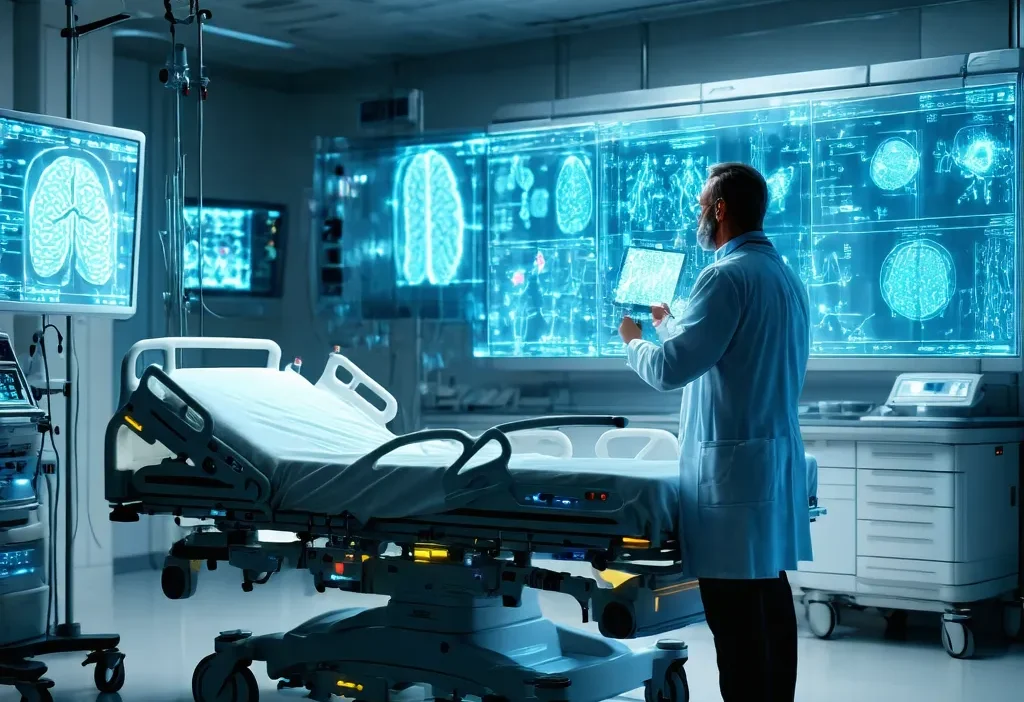The Future of Healthcare: How AI is Transforming the Industry
In 2025, artificial intelligence (AI) has become a cornerstone of modern healthcare. From diagnostics to treatment plans, AI is revolutionizing how we approach medicine. This blog explores the latest advancements and their impact on patient care.
Revolutionary Diagnostics with AI
AI-powered diagnostic tools are now standard in most hospitals. These systems analyze medical imaging with unprecedented accuracy, reducing errors and speeding up diagnoses. For instance, deep learning algorithms can detect early signs of diseases like cancer or heart conditions more efficiently than traditional methods.
- AI in Radiology: Automating the interpretation of X-rays, MRIs, and CT scans.
- Early Detection: Identifying anomalies that might be missed by human eyes.
- Time Efficiency: Reducing diagnosis time from days to minutes.
The integration of AI into diagnostics not only improves accuracy but also makes healthcare more accessible. Patients in remote areas can now benefit from expert-level analysis without traveling long distances.
Personalized Treatment Plans
AI is enabling personalized medicine, tailoring treatments to individual patient profiles. By analyzing genetic data, lifestyle factors, and medical history, AI algorithms create customized treatment plans that maximize effectiveness while minimizing side effects.
“The future of healthcare is about precision, not just treatment.” – John Smith, AI Healthcare Innovator
This approach has been particularly successful in treating complex conditions like cancer. Patients now receive therapies designed specifically for their genetic makeup, leading to better outcomes and shorter recovery times.
Smart Health Monitoring Systems
AI-powered wearables are transforming how we monitor health. Devices like smartwatches and fitness trackers equipped with AI can detect early signs of potential health issues, such as irregular heartbeats or unusual blood sugar levels.
These systems provide continuous monitoring, allowing for proactive healthcare. Patients can receive real-time feedback and alerts, preventing minor issues from becoming major health concerns. This shift towards preventive care is reducing hospital admissions and lowering overall healthcare costs.
The Ethical Landscape
As AI becomes more integral to healthcare, ethical considerations are at the forefront. Issues like data privacy, algorithmic bias, and patient autonomy must be addressed to ensure that AI technologies benefit everyone fairly.
Regulatory bodies are working closely with tech companies to establish guidelines that balance innovation with responsibility. Ensuring transparency in how AI makes decisions is crucial for building trust between patients and healthcare providers.
The Future Outlook
The healthcare industry is on the brink of a new era, thanks to AI. As technology continues to evolve, we can expect even more groundbreaking applications that improve patient care and save lives.
For instance, researchers are exploring the use of AI in drug development, which could significantly accelerate the process of bringing new medications to market. This could lead to faster treatments for diseases like Alzheimer’s or Parkinson’s.
Conclusion
The integration of AI into healthcare is not just a trend; it’s a fundamental shift that promises to redefine medicine as we know it. By embracing these advancements, we can create a future where healthcare is more precise, accessible, and effective than ever before.
As we move forward, collaboration between technologists, healthcare professionals, and policymakers will be key to harnessing the full potential of AI in healthcare. The possibilities are immense, and the benefits for humanity could be transformative.





